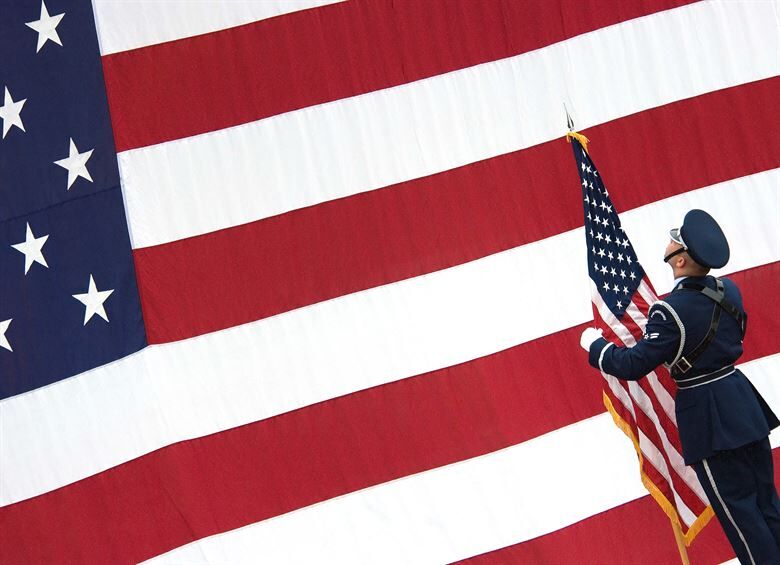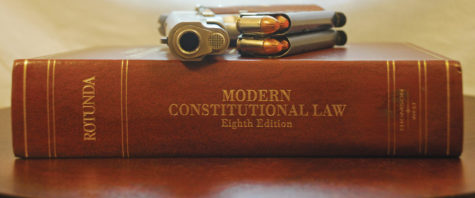Letter: Respect is a relationship, even with the flag
Letter writer Aaron Kusmec evaluates the notion of respect in response concerning the American flag.
July 30, 2020
Editor’s Note: This letter is in response to Trystian Schupbach’s “Stop disrespecting our flag.”
It is noteworthy Schupbach cannot decide what force, if any, 36 U.S. Code 301 has in his view. The argument slides in the space of two paragraphs from “kneeling during the anthem is something strictly not allowed” to “is not necessarily law, so standing is not required.”
Correctly, the next sentence links to an article where multiple legal scholars concur this section of the US Code (1) has no penalty attached, (2) would likely violate the First Amendment if enforced with a penalty and (3) uses suggestive language that lacks the obligatory force of “shall” as used in other laws. Thus, a central assertion of the article — “they are not … allowed to disrespect our national anthem” — fails on the article’s own terms.
This makes it clear that 36 U.S. Code 301 is normative in a voluntary sense: I may assent to the respect deemed appropriate by the statute and demonstrate it, but my assent may not be compelled. We should ask, then, under what conditions ought we to demonstrate the respect for the national anthem codified in 36 U.S. Code 301?
Schupbach’s answer is there are no conditions under which we ought not to adhere to the recommendations of the statute. This answer, however, fails because it misunderstands the nature of respect and conflates it with patriotism.
First, Schupbach holds that respect for the national anthem is something that should be given categorically. However, respect is a responsive relation between myself (the subject) and the national anthem (the object); it cannot be compelled but arises as an appropriate action that I perform because I deem the object worthy of that action — that is, the respect stems from a perspective I have on the object and a valuation of the object I make.
To show respect for something or someone is an expression of my agency. Challenging the status quo through civil disobedience, protest or legislation is an expression of a fundamental human agency, to ask the question, “Ought I to do what I think I ought to do?”
Second, in the case of kneeling during the national anthem, Schupbach and others argue kneeling shows disrespect because it does not follow common social practices described in 36 U.S. Code 301. Let us assume, for the sake of argument, the act of kneeling is meant as a visible sign of disrespect. What of it?
Respect is an expression of valuation, and in denying the national anthem the respect so many think it deserves, the athletes express the failure of what the national anthem symbolizes to rightfully claim their respect. From their perspective, the athletes are asked (required by some) to demonstrate respect for a country that does not promote the general welfare or protects the rights of people like them to life, liberty and the pursuit of happiness.
Recognizing the cognitive dissonance in this position, the athletes make visible their valuation that the symbol (and, by extension, the country) fail to live up to these ideals.
Third, while we might reasonably disagree about the conditions under which the national anthem should be respected, Schupbach’s final move is to assert the complaints of the athletes and activists cannot be taken seriously until they show proper respect for the flag.
This is not dissimilar to the charge leveled against Dr. Martin Luther King Jr. 53 years ago when his protests were accused of not being “well-timed.” It is the classic defense of those in power or those not subject to injustice. It is precisely the tension created by the apparent disrespect of the national anthem that is needed to “help men rise from the dark depths of prejudice and racism to the majestic heights of understanding and brotherhood” (“Letter from a Birmingham Jail”).
To argue in this way is to address the effect without considering the cause, to erase the suffering of human beings in favor of decorum and civility.
Finally, Schupbach conflates respect for the national anthem and patriotism. Patriotism is often simply defined as “love of one’s own country” and often simply applied as uncritical regard for one’s own country. Stephen Nathanson in “Patriotism, Morality, and Peace” identifies four facets of patriotism among which is special concern for the well-being of the country.
It is the concern expressed by the athletes that defines them as patriots in this sense. They are not committed to the status quo of power, a particular instantiation of the government or a particular symbol per se but to the country as an ongoing project that seeks to more fully embody the ideals set forth in its founding documents (Alasdair MacIntyre, “Is Patriotism a Virtue?”).
To disrespect the symbol and remain a patriot is not a paradox. Dr. King demonstrated his disrespect for racist laws by breaking them, but we hardly regard him as unpatriotic today. Indeed, his civil disobedience was motivated by the belief the country could become more just.
In summary, if the athletes show disrespect by kneeling during the national anthem, it expresses a negative evaluation, that the national anthem does not in fact symbolize “the land of the free and the home of the brave” in their experience.
To say the symbol is not worthy of their respect is not to lack concern for the well-being of the country.
It is to exercise their critical judgment and call the nation to self-reflection and self-improvement.
Aaron Kusmec is a graduate student in genetics.
















